从句的翻译
翻译技巧 9 状语从句的翻译
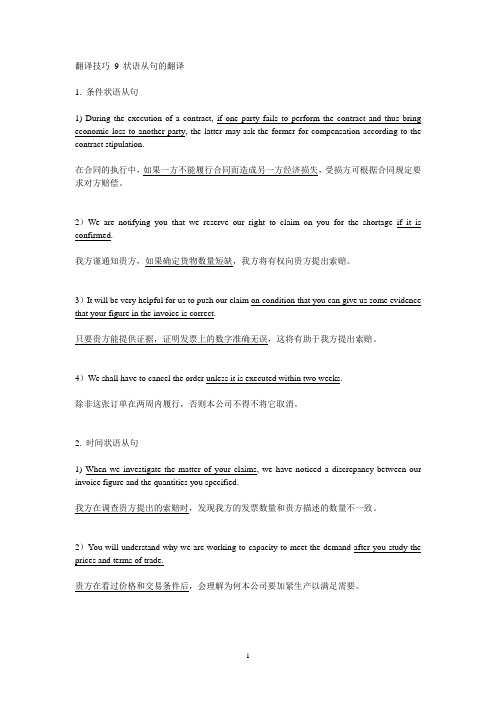
翻译技巧9 状语从句的翻译1. 条件状语从句1) During the execution of a contract, if one party fails to perform the contract and thus bring economic loss to another party, the latter may ask the former for compensation according to the contract stipulation.在合同的执行中,如果一方不能履行合同而造成另一方经济损失,受损方可根据合同规定要求对方赔偿。
2)We are notifying you that we reserve our right to claim on you for the shortage if it is confirmed.我方谨通知贵方,如果确定货物数量短缺,我方将有权向贵方提出索赔。
3)It will be very helpful for us to push our claim on condition that you can give us some evidence that your figure in the invoice is correct.只要贵方能提供证据,证明发票上的数字准确无误,这将有助于我方提出索赔。
4)We shall have to cancel the order unless it is executed within two weeks.除非这张订单在两周内履行,否则本公司不得不将它取消。
2. 时间状语从句1) When we investigate the matter of your claims, we have noticed a discrepancy between our invoice figure and the quantities you specified.我方在调查贵方提出的索赔时,发现我方的发票数量和贵方描述的数量不一致。
三大从句的翻译与特殊句型
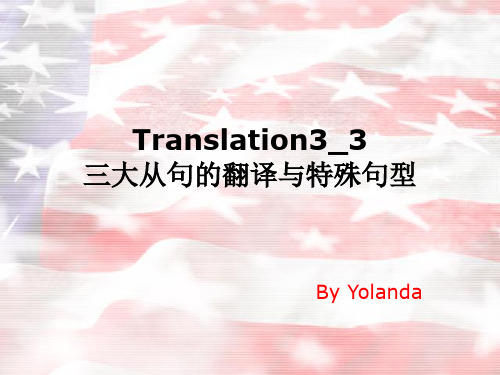
By Yolanda
三大从句的翻译方法
• 名词性从句, • 形容词性从句 • 状语从句
名词性从句
• what, how, whether, that, where, when, 引导的名词性从 句,用来做主语,宾语,表语,介 词宾语或者同位语
状语从句
3.Though引导 Though引导的从句可放在主句前,也 可放在主句后面。 翻译不同:在前翻译为“虽然…“、”尽 管...”; 在后翻译为“可是”,“不过”,“然而”
状语从句
Thought the task was difficult, they managed to accomplish it in time. 虽然任务艰巨,他们还是设法及时完成了。 He was old and poor, though he was happy 他又老又穷,但过得却快活。
状语从句
• 特殊状语从句 1.That引导 2.Before引导 3.Though引导 4.Because引导 5.Until 引导
状语从句
1.That引导 1)“the+形容词或副词比较级 +that从句” 表示原因。 the act was the bolder that he stood utterly alone.
常翻译为独立的分句,或独立从句
名词性从句与形容词性定语从句
从成分来看: • 名词性从句,做主语,宾语,表语,介词宾 语或者同位语; • 形容词性定语从句,在句子中作定语; 从结构来看: • 名词性从句,前面没有要修饰的名词; • 形容词性定语从句,前面有要修饰的名词。
That名词性从句与that引导的形容词性 定语从句 eg: that you have done such a stupid thing was incredible. eg: I saw the cat 【that caught the rat】 【that ate the grain】 【 that in the house】 【that jack built】.
英语语法:五类状语从句的翻译讲解
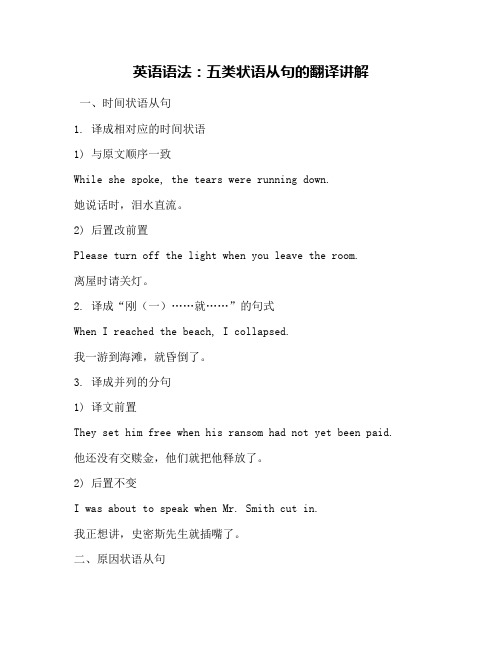
英语语法:五类状语从句的翻译讲解一、时间状语从句1. 译成相对应的时间状语1) 与原文顺序一致While she spoke, the tears were running down.她说话时,泪水直流。
2) 后置改前置Please turn off the light when you leave the room.离屋时请关灯。
2. 译成“刚(一)……就……”的句式When I reached the beach, I collapsed.我一游到海滩,就昏倒了。
3. 译成并列的分句1) 译文前置They set him free when his ransom had not yet been paid.他还没有交赎金,他们就把他释放了。
2) 后置不变I was about to speak when Mr. Smith cut in.我正想讲,史密斯先生就插嘴了。
二、原因状语从句1. 译成表“因”的分句1) “因”在“果”之前The crops failed because the season was dry.因为气候干旱,作物歉收。
2) “果”在“因”之前She could get away with anything, because she looked such a baby.她能渡过任何风险,因为她看上去简直还像娃娃模样。
2. 译成因果偏正复句中的主句Pure iron is not used in industry because it is too soft.纯铁太软,所以不用在工业上。
Because he was convinced of the accuracy of this fact, he stuck to his opinion.他深信这件事准确可靠,所以坚持己见。
3. 译成无关联词的因果关系并列分句Where there is sound, there must be sound waves.哪里有声音,哪里就必有声波。
英语八大从句类型例句
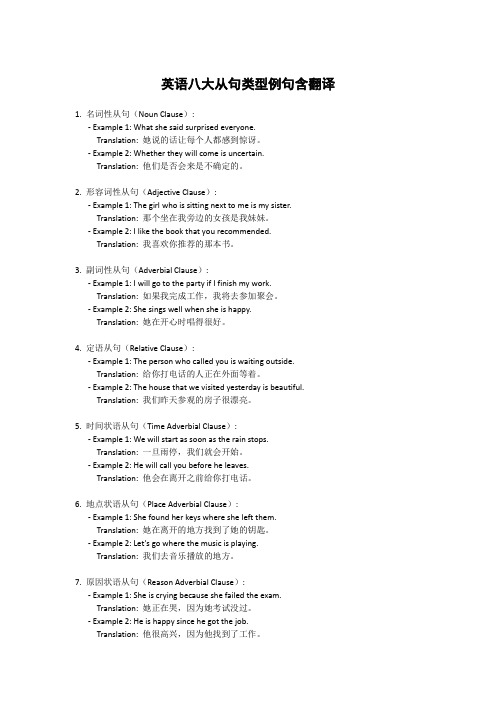
英语八大从句类型例句含翻译1. 名词性从句(Noun Clause):- Example 1: What she said surprised everyone.Translation: 她说的话让每个人都感到惊讶。
- Example 2: Whether they will come is uncertain.Translation: 他们是否会来是不确定的。
2. 形容词性从句(Adjective Clause):- Example 1: The girl who is sitting next to me is my sister.Translation: 那个坐在我旁边的女孩是我妹妹。
- Example 2: I like the book that you recommended.Translation: 我喜欢你推荐的那本书。
3. 副词性从句(Adverbial Clause):- Example 1: I will go to the party if I finish my work.Translation: 如果我完成工作,我将去参加聚会。
- Example 2: She sings well when she is happy.Translation: 她在开心时唱得很好。
4. 定语从句(Relative Clause):- Example 1: The person who called you is waiting outside.Translation: 给你打电话的人正在外面等着。
- Example 2: The house that we visited yesterday is beautiful.Translation: 我们昨天参观的房子很漂亮。
5. 时间状语从句(Time Adverbial Clause):- Example 1: We will start as soon as the rain stops.Translation: 一旦雨停,我们就会开始。
从句的译法
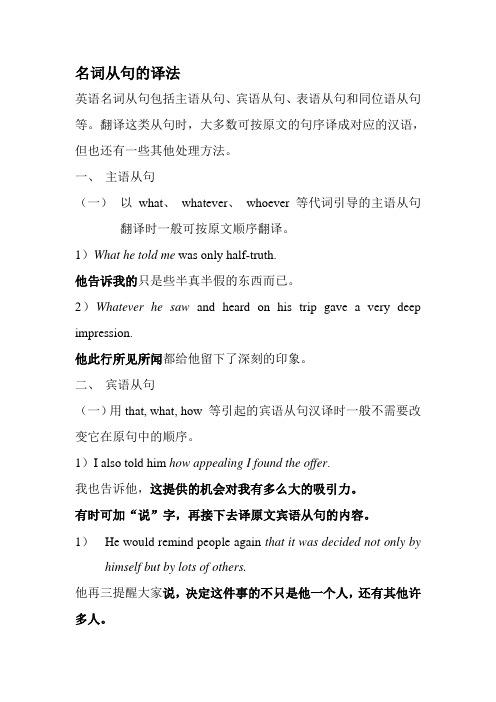
名词从句的译法英语名词从句包括主语从句、宾语从句、表语从句和同位语从句等。
翻译这类从句时,大多数可按原文的句序译成对应的汉语,但也还有一些其他处理方法。
一、主语从句(一)以what、whatever、whoever 等代词引导的主语从句翻译时一般可按原文顺序翻译。
1)What he told me was only half-truth.他告诉我的只是些半真半假的东西而已。
2)Whatever he saw and heard on his trip gave a very deep impression.他此行所见所闻都给他留下了深刻的印象。
二、宾语从句(一)用that, what, how 等引起的宾语从句汉译时一般不需要改变它在原句中的顺序。
1)I also told him how appealing I found the offer.我也告诉他,这提供的机会对我有多么大的吸引力。
有时可加“说”字,再接下去译原文宾语从句的内容。
1)He would remind people again that it was decided not only by himself but by lots of others.他再三提醒大家说,决定这件事的不只是他一个人,还有其他许多人。
三、表语从句英语表语从句和宾语从句一样,一般可按原文顺序翻译。
1)What he emphasized over and over again was that no matter how difficult it might be, they should never retreat even for an inch.他所再三强调的是,不管多么困难,他们决不应该后退寸步。
2) That was how a small nation won the victory over a big power.就这样,小国战胜了大国。
三大从句的翻译与特殊句型
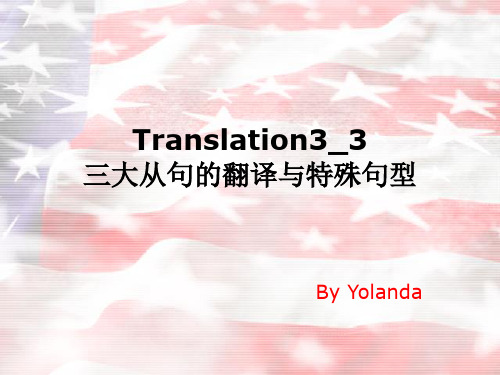
名词性从句
• What引导 引导 eg: 【what was once regarded aseality.
过去认为不可能的事现在已经成为现实。 过去认为不可能的事现在已经成为现实。 现在已经成为现实
eg: 【 what someone chooses to observe 】 and the way one observes it must, after all, in part be a reflection of experience and of ideas as to 【 what is significant 】.
状语从句
1.That引导 引导 1)“the+形容词或副词比较级 ) 形容词或副词比较级 +that从句” 表示原因。 从句” 从句 表示原因。 the act was the bolder that he stood utterly alone.
(因为 这完全是他一个人干的,所以这一行 因为)这完全是他一个人干的 因为 这完全是他一个人干的, 为更可称为大胆。 为更可称为大胆。
状语从句
1. That引导 引导 3)“not that…but (that)” 表示原因 表示原因, ) 翻译为“不是因为…而是因为 而是因为…”。 翻译为“不是因为 而是因为 。 it is not that I am unwilling to go with you, but that I’m busy now. 不是因为我不愿意跟你一起去, 不是因为我不愿意跟你一起去,而是因为我 现在很忙。 现在很忙。
你竟然做这么傻的事情,(这 你竟然做这么傻的事情,(这)真叫人难以 ,( 置信。 置信。 总结: 总结:that 引导的名词性从句常常表示强烈 愿望或惊讶,愤怒等。 愿望或惊讶,愤怒等。 如果that从句过长,常常在后半句加上 从句过长, 如果 从句过长 “这”。
定语从句的三种常见翻译法

定语从句的三种常见翻译法 考研英语中,从句是最常见的语法形式,也是构成长难句的基本要素。
正是因为从句的存在,才使得句⼦的表达层次化、多样化、复杂化。
因⽽在翻译过程中,从句也往往成为令⼈头痛的存在。
今天以定语从句为例,我们来看看⼏种常见的翻译⽅法,希望能对即将⾯对2016考研的同学有所帮助。
⼀、前置译法 如果⼀个定语从句在句中的作⽤是修饰和限定名词,那么通常就采取译为前置定语的⽅法。
但注意译成前置定语后既不能影响原⽂所表达的意思,还要使整个句⼦的表达⾔简意赅、连贯通顺、语⽓较强。
例句:Water, which is a clear liquid, has many uses. 译⽂:⽔是⼀种清澈的液体,有许多⽤途。
在前置译法的过程中如果定语从句中的谓语不含有具体意义,可省译从句中的谓语。
这种译法很简便,也很有效。
有时候,出于汉语⾏⽂的需要和逻辑关系⽅⾯的考虑,可将定语从句提在主语之前翻译,⽤来说明情况,但不作为被修饰名词的定语。
例句:There are also great advantages that come from the variety ofculture brought by settlers from other lands. 译⽂:移民从个地⽅带来了多种⽂化,产⽣了极⼤的好处。
⼆、后置译法 我们都知道,英语中很多定语从句都是为了连接两个具有共同名词的句⼦⽽存在的,因此在翻译时最好分为两个分句。
⽽对于起限定作⽤的定语从句,如果结构较为复杂,句⼦太长,⽆法译成前置的定语,最后就译成⼀个后置的并列分句,这样更合乎汉语的习惯。
例句:Our war against terror is a contest of will in which perseveranceis power. 译⽂:我们的反恐战争是⼀场意志⼒的较量。
在这场较量中,不屈不挠的精神就是⼒量。
结构较复杂的定语从句常译成后置的并列分句,在多数情况下要重译先⾏词,或即便句⼦不长,出于某种原因需要强调先⾏词,也要重译先⾏词。
英语从句翻译方法

英语从句翻译方法英语多从句,汉语多分句:就句子种类而言,英语句子不但能够在简单句中使用很长的修饰语使句子变长,同时也能够用从句使句子变复杂,而这些从句常常经过从句指引词与主句或其余从句连结,整个句子只管表面上看盘根错节倒是一个整体。
汉语原来就喜爱用短句,加上表达构造相对松懈,所以,英译汉时需要将各样英语从句进行办理,能够译成一个汉语单句,也可译成多个汉语分句。
并依据汉语的表达习惯对英语复合句的关系部分(从句指引词)加以逻辑梳理,既分而叙之,又上关下联,承接变换,如同整容。
一名词性从句的译法名词性从句包含主语从句、宾语从句、表语从句和同位语从句。
下边我们便逐个阐述这些名词性从句的翻译方法。
1.主语从句1)由 what, whatever, whoever 等代词指引的主语从句汉译时一般可按原文次序翻译。
比如:What he said is true.译文:他说的全部都是真的。
Whoever violates the disciplines should be criticized.译文:谁违反了纪律,谁就应当遇到责备。
2)由 it 作形式主语指引的主语从句,翻译时视状况能够提早,也能够不提早。
比如:It doesn't make much difference whether you come yourself or send asubstitute.译文:你是自己来仍是派代理人来,都没关紧急。
(提早)It seemed inconceivable that the pilot could have survived the crash.译文:驾驶员在飞机坠毁以后居然还活着,这看来是不行想象的。
(提早)It is strange that she should have failed to see her own shortcomings.译文:这奇异,她居然没有看出自己的弊端。
(不提早)It isreported that our country has sent another spaceship.译文:据报导,我们国家又发射了一艘宇宙飞船。
定语从句的翻译方法
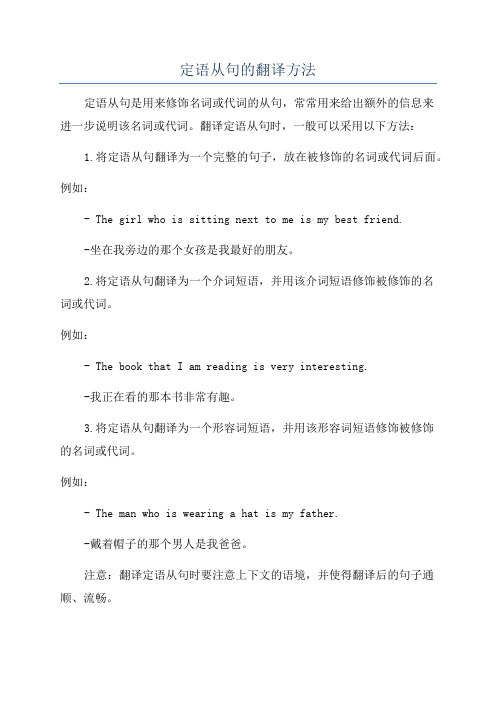
定语从句的翻译方法
定语从句是用来修饰名词或代词的从句,常常用来给出额外的信息来
进一步说明该名词或代词。
翻译定语从句时,一般可以采用以下方法:
1.将定语从句翻译为一个完整的句子,放在被修饰的名词或代词后面。
例如:
- The girl who is sitting next to me is my best friend.
-坐在我旁边的那个女孩是我最好的朋友。
2.将定语从句翻译为一个介词短语,并用该介词短语修饰被修饰的名
词或代词。
例如:
- The book that I am reading is very interesting.
-我正在看的那本书非常有趣。
3.将定语从句翻译为一个形容词短语,并用该形容词短语修饰被修饰
的名词或代词。
例如:
- The man who is wearing a hat is my father.
-戴着帽子的那个男人是我爸爸。
注意:翻译定语从句时要注意上下文的语境,并使得翻译后的句子通顺、流畅。
宾语从句翻译

宾语从句翻译
宾语从句是一个句子中充当宾语的从句。
它通常跟在动词、形容词、副词后面作宾语,可以包括主语、谓语、宾语等成分,并且具备句子的完整结构。
宾语从句的翻译方法根据具体的语境和句子结构而定。
以下是一些常见的宾语从句的翻译方法示例:
1.宾语从句作动词的宾语:
He said that he would come tomorrow.
他说他明天会来。
We know that she is studying abroad.
我们知道她正在国外学习。
2.宾语从句作形容词的宾语:
I am glad that you are here.
我很高兴你在这里。
She is worried that she might fail the exam.
她很担心可能会考试不及格。
3.宾语从句作副词的宾语:
He asked why she was late.
他问为什么她迟到了。
I wonder where they went for vacation.
我想知道他们去哪里度假了。
4.宾语从句的引导词变化:
他告诉我:“他不能来。
”
He told me that he couldn't come.
我们猜测:“他什么时候回来?”
We wondered when he would come back.
总之,宾语从句的翻译方法需要根据具体情况灵活运用,准确表达原句的意思。
如何翻译从句

如何翻译从句(总8页) -CAL-FENGHAI.-(YICAI)-Company One1-CAL-本页仅作为文档封面,使用请直接删除名词性从句的翻译英语的名词性从句包括主语从名、宾语从句、表语从句和同位语从句等。
翻译的时候,大多数可以按照原文的句子顺序翻译成相应的汉语译文。
但是,有时候,可以采用其他翻译方法来灵活处理。
一、主语从句(一)以what, whatever, whoever, whether, when, where, how, why等词引导的主语从句,在翻译的时候,一般可以按照英语原文顺序来翻译。
What he told me was only half-truth.他告诉我的只是些半真半假的东西而已。
Whatever is worth doing should be done well.任何值得做的事情都应该做好。
Whether he comes or not makes no difference.他来不来都没有关系。
When we can begin the expedition is still a question.我们何时才能开始这次考察仍然是悬而未决。
How he is going to do it is a mystery.他准备怎么做这个事情是个迷。
(二)用it作形式主语的主语从句,可以把主语从句放到汉语句子最前面去翻译。
为了强调起见,it一般可以译出来;如果不需要强调,it也可以不译出来。
It doesn’t make much difference whether he attends the meeting or not.他参加不参加会议没有多大关系。
(It没有翻译)It seemed inconceivable that the pilot could have survived the crash.驾驶员在飞机坠毁之后,竟然还能活着,这看来是不可想象的。
从句怎么翻译

从句怎么翻译从句是一个句子的一部分,包含一个主语和一个谓语,但不能独立成句。
从句可以通过引导词或连接词与主句连接起来。
从句可以分为三类:名词从句、形容词从句和副词从句。
名词从句是用作主语、宾语或表语的从句。
常见的引导词包括that, what, who, whom, whoever, whatever, which, whichever等。
名词从句可以用来引述、提问、想象、询问、命令、怀疑等。
例如:- I don't know what he wants.- Can you tell me where they are?- Whoever did this will be punished.形容词从句用来修饰名词或代词,通常放在被修饰词后面。
常见的引导词包括that, which, who, whom, whose, whoever, whatever等。
形容词从句使句子更加具体,并提供附加信息。
例如:- The book that I'm reading is very interesting.- She has a friend whose father is a famous actor.副词从句用来修饰动词、形容词、副词或整个句子,通常放在被修饰词后面。
常见的引导词包括when, where, why, how, if, whether, because, although等。
副词从句提供了时间、地点、原因、方式、条件等附加信息。
例如:- I will call you when I arrive.- He asked her why she was crying.总结起来,从句是一个句子的一部分,通过引导词或连接词与主句连接起来。
名词从句用作主语、宾语或表语,形容词从句用来修饰名词或代词,副词从句用来修饰动词、形容词、副词或整个句子。
翻译从句时需要注意保持句子的完整性和语法结构,并正确理解从句与主句之间的逻辑关系。
名词从句的译法

名词从句的译法名词从句的译法英语名词从句包括主语从句、宾语从句、表语从句和同位语从句等。
翻译这类从句时,大多数可按原文的句序译成对应的汉语,但也可由一些其它处理方法。
现分述如下。
一、主语从句1.以what, whatever, whoever 等代词引导的主语从句翻译时一般可按原文顺序翻译。
1)What he told me was only half-truth.他告诉我的只是这些半真半假的东西而已。
2)Whatever he saw and heard on his trip gave him a very deep impression.他此行所见所闻都给他留下了深刻的印象。
3)Whoever has made a voyage up the Hudson must remember the Kaatskill Mountains.凡是在哈得逊河上游航行过的人是一定记得卡兹吉尔群山的。
2.以it 作形式主语所引出的真主语从句,翻译时视情况可以提前,也可以不提前。
(1)形式主语从句提前译,为了强调起见,it一般可以译出来,如果不需要强调,it也可以不译出来。
1) It doesn’t make much difference whether he attends the meeting or not.他参加不参加会议没有多大关系。
2) It is a fact that the U. S. S. R. has sent its fleet to all parts of the world.苏联已把它的舰队派往世界各地,这是事实。
3) It seemed inconceivable that the pilot could have survived the crash.驾驶员在飞机坠毁之后,竟然还能活着,这看来是不可想象的。
(2)形式主语从句不提前,it一般不需要译出来。
1) It is strange that she should have failed to see her own shortcomings.真奇怪,她竟然没有看出自己的缺点。
从句的翻译
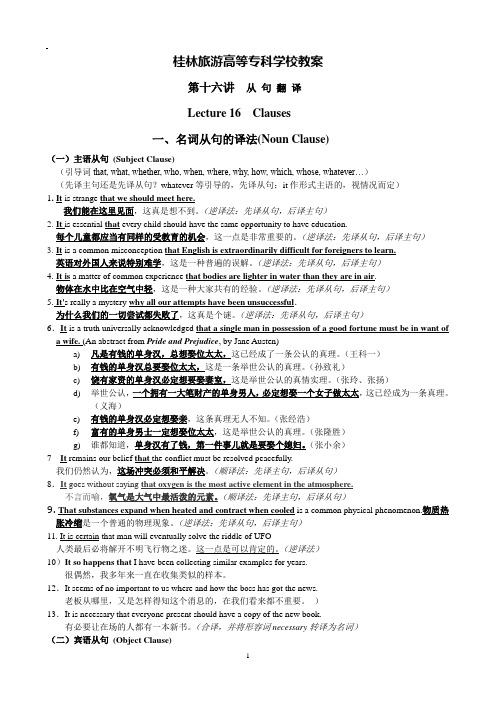
桂林旅游高等专科学校教案第十六讲从句翻译Lecture 16 Clauses一、名词从句的译法(Noun Clause)(一)主语从句(Subject Clause)(引导词that, what, whether, who, when, where, why, how, which, whose, whatever…)(先译主句还是先译从句?whatever等引导的,先译从句;it作形式主语的,视情况而定)1.It is strange that we should meet here.我们能在这里见面,这真是想不到。
(逆译法:先译从句,后译主句)2. It is essential that every child should have the same opportunity to have education.每个儿童都应当有同样的受教育的机会,这一点是非常重要的。
(逆译法:先译从句,后译主句)3. It is a common misconception that English is extraordinarily difficult for foreigners to learn.英语对外国人来说特别难学,这是一种普遍的误解。
(逆译法:先译从句,后译主句)4. It is a matter of common experience that bodies are lighter in water than they are in air.物体在水中比在空气中轻,这是一种大家共有的经验。
(逆译法:先译从句,后译主句)5. It's really a mystery why all our attempts have been unsuccessful.为什么我们的一切尝试都失败了,这真是个谜。
(逆译法:先译从句,后译主句)6.It is a truth universally acknowledged that a single man in possession of a good fortune must be in want of a wife. (An abstract from Pride and Prejudice, by Jane Austen)a)凡是有钱的单身汉,总想娶位太太,这已经成了一条公认的真理。
定语从句翻译
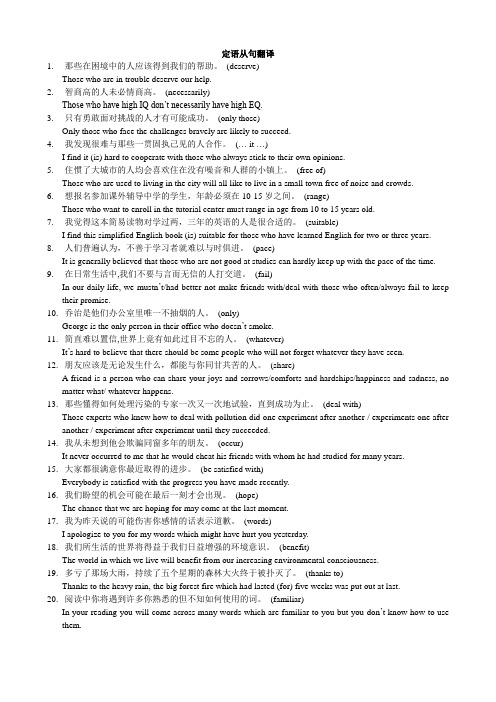
定语从句翻译1.那些在困境中的人应该得到我们的帮助。
(deserve)Those who are in trouble deserve our help.2.智商高的人未必情商高。
(necessarily)Those who have high IQ don’t necessarily have high EQ.3.只有勇敢面对挑战的人才有可能成功。
(only those)Only those who face the challenges bravely are likely to succeed.4.我发现很难与那些一贯固执己见的人合作。
(… it …)I find it (is) hard to cooperate with those who always stick to their own opinions.5.住惯了大城市的人均会喜欢住在没有噪音和人群的小镇上。
(free of)Those who are used to living in the city will all like to live in a small town free of noise and crowds.6.想报名参加课外辅导中学的学生,年龄必须在10-15岁之间。
(range)Those who want to enroll in the tutorial center must range in age from 10 to 15 years old.7.我觉得这本简易读物对学过两,三年的英语的人是很合适的。
(suitable)I find this simplified English book (is) suitable for those who have learned English for two or three years.8.人们普遍认为,不善于学习者就难以与时俱进。
(pace)It is generally believed that those who are not good at studies can hardly keep up with the pace of the time. 9.在日常生活中,我们不要与言而无信的人打交道。
高考英语复习名词性从句的翻译

名词性从句的翻译英语的名词性从句包括主语从句、宾语从句、表语从句和同位语从句。
翻译的时候,大多数可以按照原文的句子顺序翻译成相应的汉语译文。
但有时候也需要采用其他翻译方法来灵活处理。
一、主语从句1)以关联词what, whatever, whoever, when, where, how, why或从属连词that, whether等词引导的主语从句,一般可以按照英文原句的顺序来翻译,即一般放在句首,作为主从复合句的主语。
例如:What he told me was a sheer lie.他对我说的全是谎言。
Whatever I saw and heard on my trip left me a very deep impression.一路上的所见所闻给我留下了深刻的印象。
Whoever has made a trip to Huangshan must remember the clouds there.凡是去过黄山的人都不会忘记黄山的云。
Whether an organism is a plant or an animal sometimes taxes the brain of a biologist.一种生物究竟是植物还是动物,有时会让生物学家颇伤脑筋。
2) 对于it作形式主语的主语从句,可以先译主句,顺译为无人称句。
有时也可先译从句,再译主句,这样的话,一般需要在主句前加译“这”。
需要注意的是,如果强调it,可以将其译出;如果不需要强调,也可不译。
例如:It is strange that she should have failed to see her own shortcomings.真奇怪,她竟然看不出自己的缺点。
It seemed incredible that she should have lied to us.她居然对我们说谎,这真是不可思议。
It doesn’t make much difference to me whether you come or not.你来不来我不在乎。
各种从句的翻译

他看起来好像昨晚没睡好。
分析
在这个句子中,“as if he hasn't had a good night's sleep”是表语从句,对主语“He”进行描述。在翻译时 ,可以将引导词“as if”翻译为“好像”,将句子翻译为 “他看起来好像昨晚没睡好”。
04 同位语从句的翻译
CHAPTER
状语从句的翻译技巧
理解从句的语义关系
在翻译状语从句时,首先要理解从句与主句 之间的语义关系,确定从句在句子中的作用 和含义。
调整语序
由于中英文表达习惯的不同,翻译时可能需要对语 序进行调整,使译文更加符合目标语言的表达习惯 。
选用合适的引导词
在翻译过程中,需要根据从句的语义关系选 择合适的引导词,确保译文的准确性和流畅 性。
例句2
The book which you lent me was very interesting.
翻译
我们班有个女孩,她的父亲是位 著名的科学家。(融合法)
例句3
There is a girl in our class whose father is a famous
scientist.
翻译
你借给我的那本书很有趣。(后 置法)
主语从句的翻译技巧
顺译法
01
按照汉语的表达习惯,将主语从句放在句首进行翻译。
倒译法
02
为了符合汉语的表达习惯,将主语从句放在句末进行翻译,同
时用“这”、“那”等代词复指。
融合法
03
将主语从句和主句融合在一起进行翻译,使译文更加流畅自然
。
案例分析
案例一
案例二
That the earth goes round the sun is known to all. 地球绕着太阳转是众所周知 的。
- 1、下载文档前请自行甄别文档内容的完整性,平台不提供额外的编辑、内容补充、找答案等附加服务。
- 2、"仅部分预览"的文档,不可在线预览部分如存在完整性等问题,可反馈申请退款(可完整预览的文档不适用该条件!)。
- 3、如文档侵犯您的权益,请联系客服反馈,我们会尽快为您处理(人工客服工作时间:9:00-18:30)。
• (1)重复关系词所指代的含义 • 5. He is with his youngest brother, who is
accompanying him on his tour in China.
• 他和他的小弟弟在一起。他的小弟弟正陪同他
在中国旅游。
• 6. I have to book ahead for concerts, which are usually held in London.
最好是…
• It is evident that…
很明显(或显然)…
• It is noteworthy that…
值得注意的是…
• It is assumed that…
假定…
• It cannot be denied that…
无可否认的是…
• It is preferred that…
• 他突然想起他忘了带笔记本了。
• (2)倒译
• 8. It doesn’t matter where we are going on holiday.
• 我们去哪儿渡假都没关系。
• 9. Has it been announced when the planes are to take off?
• 月球上没有空气和水。因此生物在月球上不能
生存。
• 17. That was how they were defeated.
• 他们就是这样给打败的。
• C.有时可用倒译 • 18. Raw material is what we are badly in
need of.
• 我们急需的是原料。
• III.宾语从句的译法 • A. 英语的宾语从句有三种:翻译宾语从句一般都
• 21. He was not conscious of what an important discovery he had made.
• 他没意识到他的这一发现多么重要。
• 22. You may be sure that heபைடு நூலகம்is honest.
• 你可以相信他是诚实的。
• 23. We are certain that we’ll be able to accomplish the designing in a short period of time.
• 必须抵制将约翰开除的任何提议。
• C.用转换法将同位与从句转译为汉语的复合结 构作宾语
• 33. This thought came to him that maybe he had left his keys in the bedroom.
• 他突然想起他可能把钥匙遗忘在卧室里了。
• 34. Is this not another proof that the socalled détente is just empty talk?
• 飞机什么时候起飞播报了没有?
• (3)顺译或倒译,两者均可 • 10. It is common knowledge that the whale
is not a fish. • 众所周知,鲸不是鱼。
• 或:鲸不是鱼,这是众所周知的。
• (4)主从合译 • 11. It is probable that he has got the clue
• (1)顺译 • 6. It hasn’t been made clear when the new
expressway is to be opened to traffic.
• 还不清楚新高速公路什么时候通车。
• 7. It occurred to him that he had forgotten to take his notebook with him.
• 老师给学生讲清楚了,必须在星期五以前交作文。
• IV.同位语从句的译法
• A.用顺译法将同位语从句译为汉语的独立句,并 根据具体情况在前面加冒号、破折号或加“即” 等表同位关系的词
• 27.Then arose the question where we were to get the materials needed.
• 再进一步往回想,就回到一个蒸汽机及相关的 发明尚未导致工业革命的世界。
• 4. The speech, which he had written on little bits of paper, seemed endless.
• 他那事先写在小纸片上的发言稿念起来好像没
完没了。
• B. 分译法
• 我们肯定能在短期内完成这项设计。
• B.介词宾语从句若位为位于句首,有时根据 汉语习惯,采用倒译法
• 24. Did she say anything about how the work was to be done?
• 关于这项工作该怎么做她说了什么没有?
• C.英语中有时用it作形式宾语,而把宾语从句放 在句末。译成汉语时,应将形式宾语省译,而宾 语从句则按汉语表达习惯要么用倒译要么用顺译
• 2. James Russll is a man for whom I have the greatest respect.
• 詹姆斯.罗索是我最尊重的人。
• 3. Go back further, to a world where the steam engine and allied inventions had not yet enabled industrialization.
• 事物并不总是像表面上看来的那样。
• 15. That is why we decided to put the discussion off.
• 这就是我们坚决推迟讨论的原因。
• B.有时可将主从句合译 • 16. There is no air and water on the moon.
That’s why no living things can live there.
• 于是就产生了这样一个问题:我们到哪里去找所 需要的材料。
• 28. Can you produce any evidence that he was not at home that night?
• 你能不能提出证据,证明那天夜里他不在家。
• 29. In July 1898, Madame Curie and her husband got a great success that they discovered the radioactive element, polonium.
the end
•定 语 从 句 的 译 法
• I.定语从句常用的翻译方法 • A.倒译法对限制性和非限制性定语从句都适用,
不过更多地用于不太复杂的限制性定语从句
• 1. Those who want to go please sign their names here.
• 想去的人请在这儿签名。
• “火山”这一名称表明古希腊人的这一信念,即地
中海沿岸燃烧着的大山是锻冶之神“伍尔坎”的工 场。
• B.用倒译法将同位语从句译为前置修饰语 • 31. There was little probability that they
would succeed.
• 他们成功的可能性极小。
• 32. Any proposals that John should be dismissed must be resisted.
• 我得预购音乐会的票。这些音乐会通常在伦敦
举行。
• 7. The critical value is expressed as =(S1)(1-P) where S is specific gravity of material, P is percentage of voids in material expressed as a decimal.
用顺译法
• 19. I can’t make out what they are talking about.
• 我不清楚他们在谈什么。
• 20. She reminded me that I had a meeting to attend that evening.
• 她提醒我晚上要参加一个会议。
•名 词 从 句 的 译 法
• I.主语从句的译法 • 含主语从句的句型有 • 1)“主语从句+主句谓语+其他成分”; • 2) “形式主语it+主句谓语+主语从句”。
• A. 上述第一种句型一般用顺译法 • 1.That she survived the earthquake is
sheer luck.
• 她说的短短几句话很发人深思。
• 5. That he was in error will scarcely be disputed by his warmest friends.
• 他弄错了,而他那些真诚的朋友对此不会提出质疑。
• B. 翻译第二种句型的句子,除需省译形式主 语it外,还需根据汉语的表达习惯,有的用顺 译,有的用倒译,有的两者均可,有时主从合 译。
• 这难道不又一次证明所谓缓和只不过是句空话。
• 35. He gave the order that all the prisoners be set free.
• 他命令释放所有的犯人。
• 36. The story goes that the expedition was
a failure.
• 据说这次远征失败了。
• 当定语从句较长,或先行词有较多的前置定语 时,若再将定语从句倒译为前置定语,可能会 使译文条理不明,含义不清。在这种情况下, 把定语从句分译为单独的句子却能避免这些弊 病。翻译限制性和非限制性定语从句都可能用 到分译法,但这种方法更多地适用于非限定性 定语从句。使用分译法有两种形式:重复关系 代词所指代的含义和省译关系词。
